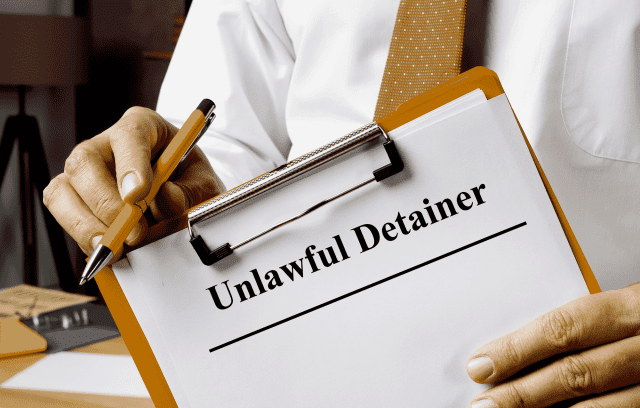How Our Los Angeles Unlawful Detainer Attorneys Can Help A Commercial Tenant
If you’re a commercial tenant in Los Angeles facing eviction, speak with our legal Los Angeles Unlawful Detainer lawyers to protect your rights. We’ve helped businesses defend their lease rights in Los Angeles and across Southern California.
Simantob Law Group is a law firm of business attorneys and real estate lawyers in Los Angeles. We have represented the business and real estate legal needs of individuals and companies, from start-ups to regional and national US corporations for over 20 years. Please contact us at 310.281.0041 or complete our online contact form to discuss your unlawful detainer matter with a Los Angeles Unlawful Detainer Attorney.
If you’re a commercial tenant in Los Angeles facing eviction, understanding your legal defenses could make or break your unlawful detainer defense.
Commercial Tenant’s Defenses in Commercial Unlawful Detainer Actions


1. Defense of Retaliatory Eviction Not Availabe in Commerical Unlawful Detainer Actions
In Los Angeles commercial eviction cases, commercial tenants often assume they can assert the defense of retailiatory eviction — however, the defense is not allowed in commercial unlawful detainer actions under current California law
The statutory defense of retaliatory eviction does not apply to commercial tenancies, as Civil Code §1942.5 applies only to “the lessee of a dwelling.”
The common law defense of retaliation is available for commercial tenants. 1 However, to asset the defense of retaliatory eviction, the tenant must have voluntarily vacated the premises. A tenant who has not voluntarily vacated the premises “cannot state a common law cause of action for retaliatory eviction.2”. The landlord’s retaliatory conduct must cause the tenant to involuntarily vacate the premises in order for the tenant to raise the claim.3
2. Commercial Tenants Cannot Assert Rent Abatement as a Defense in Unlawful Detainer Actions
California commercial tenants assert the defense of “rent abatement” in commercial unlwafut detainer actions. However, the defense of abatement of rent based on landlord’s breach of the lease is not available in commercial unlawful detainer actions unlawful detainer actions.
In Underwood v Corsino (2005) 133 CA4th 132, the landlord brought an unlawful detainer action against a commercial tenant, based on nonpayment of rent. The tenant claimed the rent should be abated because the landlord breached the lease, The court of appeal held that although CCP §1174.2 permits rent abatement for residential tenant, no comparable statute permits rent abatement for commercial tenants, so the abatement remedy is not permitted.4
Abatement of rent is not available in commercial setting and no evidence of abatement of rent may be introduced at a commercial unlawful detainer action.
3. There is No Defense of Breach of Implied Warranty of Habitability in Commercial Setting
In California commercial unlawful detainer actions, commercial tenants need to know that the defense based on the breach of implied warranty of habitability is not available.
In Schulman v. Vera (1980) 108 CA3d 552, 560-561 the court held that the implied warranty of habitability may not be raised by a commercial tenant as a defense to an unlawful detainer action based on nonpayment of rent as the obligation to pay rent in commercial lease is an independent covenant, not tied to an implied warranty.
In unlawful detainer actions involving commercial leases, the obligation to pay rent is an independent covenant. Further, “[i]f the parties’ [contract] obligations are independent, the breach by one party does not excuse the other party’s performance. Instead, the non-breaching party still must perform and its remedy is to seek damages from the other party based on its breach of the contract. 5
The defense of implied warranty of habitability is not applicable to unlawful detainer actions involving commercial tenancies. (Schulman v. Vera (1980) 108 Cal.App.3d 552, 558-563 [166 Cal.Rptr. 620] For a commercial tenant to maintain an action against a commercial landlord for breach of a lease provision such as a covenant to repair or maintain the premises, the tenant must bring a separate action. Such a tenant cannot defend an unlawful detainer action based on nonpayment of rent by claiming the landlord breached an express covenant to repair. (Ibid)”
The implied covenant of habitability does not apply to commercial leases and no evidence relating to habitability may be introduced at a commercial unlawful detainer trial. Tenant’s obligation to pay rent is entirely independent of Landlord’s obligations.
4. Implied Covenant of Quiet Enjoyment is Not Available in Commercial Unlawful Detainer Actions
Los Angeles commercial tenants facing unlawful detainer actions, need to know that no reported case allows a commercial tenant in California to withhold rent owed under the lease unless the tenant has surrendered possession.
In Petroleum Collections, Inc. v Swords (1975) 48 CA3d 841, a commercial tenant sought to defend an action for unpaid rent by claiming that the landlord had breached the implied covenant of quiet enjoyment. The court held that the landlord’s improper installation of a sign, in violation of local codes, could serve as a basis for the tenant’s claim, but no breach of the implied covenant could be claimed unless and until the tenant vacated within a reasonable time (i.e., until a constructive eviction occurred). Then, if the landlord sued for rent accrued before the constructive eviction, the tenant could claim as an offset any damages arising before and from the eviction, or bring an affirmative action for such damages.
Consequently, a tenant’s use of the breach of the covenant of quiet enjoyment as a defense in an unlawful detainer action for nonpayment of rent is contrary to California law.
5. No Repair and Deduct Statutory Remedy for Commercial Leases
Civil Code Section 1942 applies to residential tenancies as the section imposing standards of tenantability (CC §1941.1), begins, “A dwelling shall be deemed untenantable for purposes of [CC §1941] … ,” clearly indicating that only residential buildings are covered. As such the repair and deduct rights of Civil Code Section 1942 do not apply to commercial tenancies.
6. No Legal Duty for Landlord’s to Repair in A Commercial Lease – What the Commercial Lease Must State
Landlord has no duty to repair unless the Lease expressly so provides.6 The duties of a commercial landlord regarding preparing or maintaining the premises are explained in a treatise, 7 Miller & Starr, California Real Estate (3d ed. 1997) section 19:118, page 360 (Miller & Starr), as follows:
“In the absence of an express covenant in the lease, the landlord is not obligated to prepare nonresidential premises for the tenant’s use, or to keep them in repair, except to the extent that he or she retains control over an area used in common by the public or other tenants. [¶] There is no implied covenant by the landlord that nonresidential premises leased are tenantable, or in any particular condition, or fit for the purpose for which they are leased or intended to be used by the tenant, or that they will continue to be fit for such purposes, even though the landlord knows the nature of the use intended. “
Landlord has no duty to maintain, repair or replace unless the lease requires landlord to repair and maintain.
As such, no evidence can be presented to demonstrate or imply that Landlord has the duty to maintain, repair or replace the Premises unless the lease states it does.
Even if Landlord has a duty to maintain and repair, the covenant to pay rent is independent covenant. See, Schulman v. Vera (1980) 108 Cal.App.3d 552, 560-61 (finding that obligation to pay rent in commercial lease is an independent covenant, not tied to an implied warranty). As such, breach of duty to maintain and repair by Landlord cannot be used as a defense in a commercial unlawful detainer action.
1See, Custom Parking v Superior Court (1982) 138 CA3d 90, 101
2Banuelos v LA Investment, LLC (2013) 219 CA4th 323, 328.
3Banuelos v LA Investment, LLC (2013) 219 CA4th 323, 328.
4See also Fish Constr. Co. v Moselle Coach Works, Inc. (1983) 148 CA3d 654, 658
5Colaco v. Cavotec SA (2018) 25 Cal.App.5th 1172, 1183 (citing Fresno Canal and Irr. Co. v. Perrin (1915) 170 Cal. 411, 416.
6Glenn R. Sewell Sheet Metal, Inc. v Loverde (1969) 70 C2d 666, 671 and Del Taco, Inc. v. University Real Estate Partnership V (2003) 111 Cal. App. 4th 16, 23.


HOW OUR LOS ANGELES UNLAWFUL DETAINER ATTORNEYS CAN HELP A COMMERCIAL TENANT
If you’re a commercial tenant in Los Angeles facing eviction, speak with our legal Los Angeles Unlawful Detainer Attorney team to protect your rights. We’ve helped businesses defend their lease rights in Los Angeles and across Southern California.
Simantob Law Group is a law firm of business attorneys and real estate lawyers in Los Angeles. We have represented the business and real estate legal needs of individuals and companies, from start-ups to regional and national US corporations for over 20 years. Please contact us at 310.281.0041 or complete our online contact form to discuss your unlawful detainer matter with a Los Angeles Unlawful Detainer Attorney.
